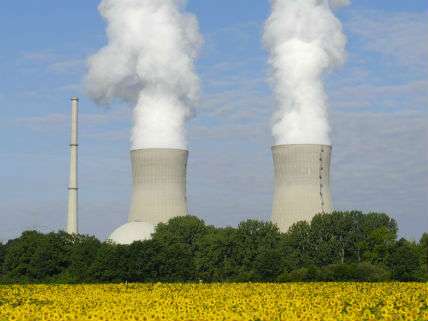Nuclear Power Subsidies Adopted by Illinois State Government
Subsidies for Everybody! Nukes evidently need subsidies to compete with renewable subsidies.

What source of power provides no-carbon on-demand electricity? Well, yes, hydropower dams do, but the vast majority of no-carbon power in the United States is generated by nuclear power plants. So for folks worried about man-made global warming caused by the increasing atmospheric carbon dioxide concentrations as a result of burning fossil fuels, wouldn't it be a good idea to build more nuclear power plants? For such folks, it would also seem to be a no-brainer that they should at least want those that are currently producing copious no-carbon power to keep operating, right? However, a perhaps unintended consequence of subsidizing intermittent renewable power sources has arisen; their subsidized electricity outcompetes unsubsidized and over-regulated nuclear power. As a result, nuclear power operators can't make a profit, so many are threatening to close down their plants.
Since renewable sources of power cannot (yet) supply baseload electrity, this means that new natural gas and even coal power plants would have to open to replace the lost nuclear generation capacity. Of course, this means boosting, not reducing, carbon dioxide emissions. So what to do? The answer appears to be: Subsidies for Everybody! This solution to the problem of competing subsidies was adopted in August by New York State when it kept open several nuclear power plants by offering their operators subsidies amounting to about $500 million per year.
Illinois yesterday enacted similar legislation aiming to keep three of the state's nuclear power plants open as they compete with subsidized renewable energy. The so-called Future Energy Jobs Act would provide nuclear plant operator Exelon with around $235 million a year for up to 13 years. Nevertheless, this is another victory for Michael Shellenberger and his eco-modernist Environmental Progress group that is spearheading the campaign to keep U.S. nuclear power plants open as a way to address whatever problems man-made climate change may cause.
In its report on the adoption of the Future Energy Jobs Act, World Nuclear News cogently noted:
Agneta Rising, director-general of the World Nuclear Association, said the bill would ensure continued operation of the Quad Cities and Clinton nuclear plants, providing clean and reliable electricity as part of a package of measures designed to boost a range of low-carbon energy technologies. "In the longer term we need markets to deliver the electricity mix that we need, without intervention. Markets should recognise the value of secure and reliable electricity supplies, as well as the environmental benefits of different forms of electricity generation," she said.
Without intervention? What a novel idea!


Show Comments (79)